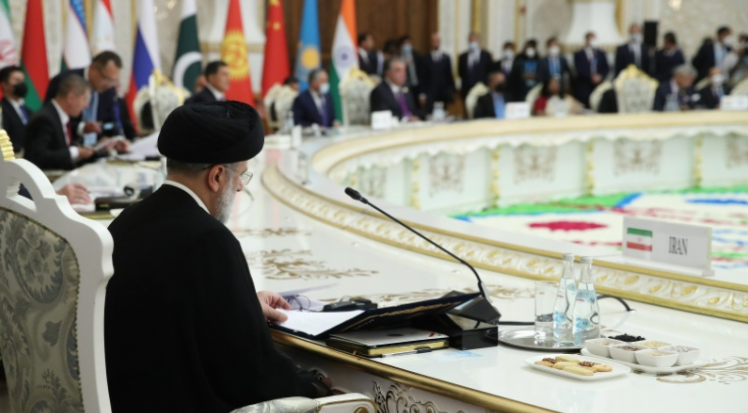October 08, 2021
by Warren L. Nelson

After 16 years of trying, Iran was finally admitted September 17 as a member of the Shanghai Cooperation Organization (SCO), a group formed by China, Russia and the Central Asian states that used to be part of the Soviet Union primarily to fight terrorism.
Analysts said it has taken two years for previous new members to complete all the details for admission.
The Islamic Republic gave huge media prominence to its joining and billed its membership as a key to boosting its trade with the SCO members, though it isn’t clear that Iran will really gain much. The two-decade-old organization has been little more than a letterhead group without much to show for its existence. Still, state broadcasting in Iran emphasized that membership would give its products access to huge new markets, although China is already Iran’s major trading partner.
China and India already account for 80 percent of Iran’s trade with the eight SCO members, and trade with those two countries was never restricted by virtue of Iran not being in the SCO.
The bureaucratic procedures for admission are expected to take two years, so any benefits won’t be seen for some time.
State broadcasting also touted the membership as a huge victory for President Raisi.
Ayatollah Ahmad Alam-ol-Hoda, the Friday prayer leader in Mashhad and father-in-law of Raisi, told the Iranian Students News Agency, “Some 43 years after the Islamic Revolution, the world has come to recognize us as a power that is the rival of the United States. Unlike the West, the Eastern world has come to us in all modesty, recognizing our authority. This is the point we have reached!”
Iran applied for full membership in 2005. But until this year, it was blackballed by at least one of the member states each year, with Tajikistan understood to be the major opponent because of Iran’s support for an Islamist opposition group in Tajikistan.
President Raisi attended the meeting that admitted Iran in his first foray abroad as president. In his speech to the group, he emphasized US sanctions and urged the SCO to do its utmost to counter sanctions.
The SCO was formed in 2001 and was focused on Central Asia. Four of the five Central Asian states all but Turkmenistan joined. Four years ago, India and Pakistan were approved as full members, but Iran was rejected. Russian officials said Iran would not be approved until sanctions were lifted but sanctions have not been lifted, so that does not seem to be have been the impediment.
The importance of the group may be seen in the fact the chiefs of state of three of the eight members China, Russia and India did not even bother to attend he gathering.
Another dent for the group is the fact that Afghanistan is an official “observer” at the organization. But it was not invited to attend this year since the Taliban takeover. There was some tongue-wagging over the embarrassment of an official observer at an anti-terrorist group being among the world’s renown terrorist organizations. Russian Foreign Minister Sergei Lavrov said, “We must use the capabilities of the SCO to rebuild Afghanistan and counter terrorism and extremism.”
While the Islamic Republic touts its membership in the SCO as a big deal, Fardin Eftekhari, a doctoral candidate at the University of Tehran, wrote in the magazine The Diplomat that it’s hard to see any benefit for Iran.
“Iran’s insistence on having a seat at the table only generates more leverage for Moscow and Beijing to bolster the country’s overreliance on the East,” he wrote.
“Efforts to gain a seat in these largely ineffective initiatives, where Russia and China are the dominant stakeholders and it is nearly impossible for Tehran to seek tangible and achievable goals, does nothing but waste the limited diplomatic resources of the country.















